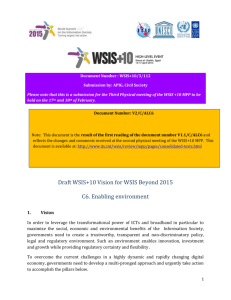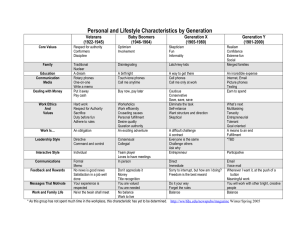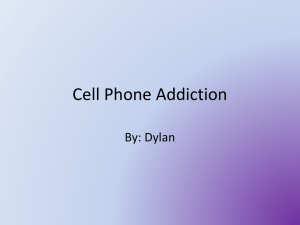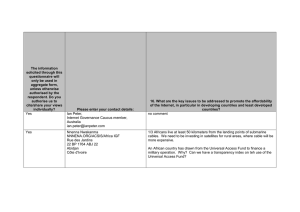Thank you Dr Touré, Ministers, Distinguish Quests, Ladies and
advertisement
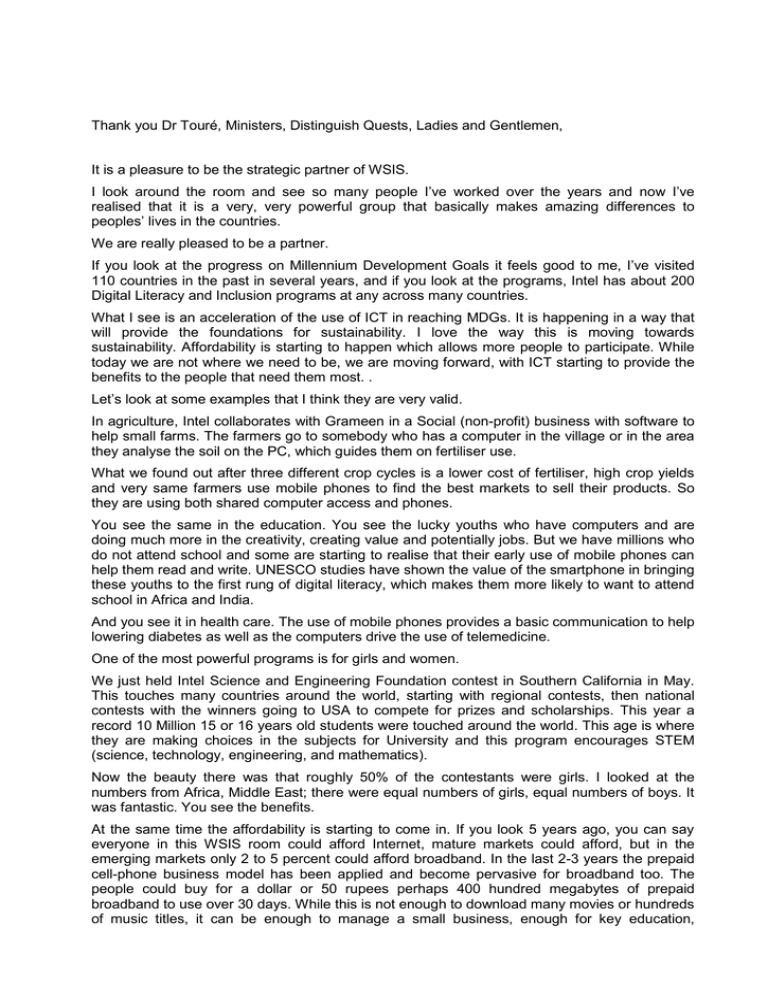
Thank you Dr Touré, Ministers, Distinguish Quests, Ladies and Gentlemen, It is a pleasure to be the strategic partner of WSIS. I look around the room and see so many people I’ve worked over the years and now I’ve realised that it is a very, very powerful group that basically makes amazing differences to peoples’ lives in the countries. We are really pleased to be a partner. If you look at the progress on Millennium Development Goals it feels good to me, I’ve visited 110 countries in the past in several years, and if you look at the programs, Intel has about 200 Digital Literacy and Inclusion programs at any across many countries. What I see is an acceleration of the use of ICT in reaching MDGs. It is happening in a way that will provide the foundations for sustainability. I love the way this is moving towards sustainability. Affordability is starting to happen which allows more people to participate. While today we are not where we need to be, we are moving forward, with ICT starting to provide the benefits to the people that need them most. . Let’s look at some examples that I think they are very valid. In agriculture, Intel collaborates with Grameen in a Social (non-profit) business with software to help small farms. The farmers go to somebody who has a computer in the village or in the area they analyse the soil on the PC, which guides them on fertiliser use. What we found out after three different crop cycles is a lower cost of fertiliser, high crop yields and very same farmers use mobile phones to find the best markets to sell their products. So they are using both shared computer access and phones. You see the same in the education. You see the lucky youths who have computers and are doing much more in the creativity, creating value and potentially jobs. But we have millions who do not attend school and some are starting to realise that their early use of mobile phones can help them read and write. UNESCO studies have shown the value of the smartphone in bringing these youths to the first rung of digital literacy, which makes them more likely to want to attend school in Africa and India. And you see it in health care. The use of mobile phones provides a basic communication to help lowering diabetes as well as the computers drive the use of telemedicine. One of the most powerful programs is for girls and women. We just held Intel Science and Engineering Foundation contest in Southern California in May. This touches many countries around the world, starting with regional contests, then national contests with the winners going to USA to compete for prizes and scholarships. This year a record 10 Million 15 or 16 years old students were touched around the world. This age is where they are making choices in the subjects for University and this program encourages STEM (science, technology, engineering, and mathematics). Now the beauty there was that roughly 50% of the contestants were girls. I looked at the numbers from Africa, Middle East; there were equal numbers of girls, equal numbers of boys. It was fantastic. You see the benefits. At the same time the affordability is starting to come in. If you look 5 years ago, you can say everyone in this WSIS room could afford Internet, mature markets could afford, but in the emerging markets only 2 to 5 percent could afford broadband. In the last 2-3 years the prepaid cell-phone business model has been applied and become pervasive for broadband too. The people could buy for a dollar or 50 rupees perhaps 400 hundred megabytes of prepaid broadband to use over 30 days. While this is not enough to download many movies or hundreds of music titles, it can be enough to manage a small business, enough for key education, manage personal health care and manage their lives. Prepaid model allows lower incomes to benefit from Internet when they have small amounts of money available. And I’ve seen many ARPUs of these new customers with 1-2 dollars a month. These are new customers to the industry, so the industry benefits. It is sustainable. There is a sustainable business model, just like in a voice phone. Internet affordability is now reached the 3rd billion and may just be starting to touch the 4th billion. All of this incremental affordability has been in the emerging markets. Now, beyond that, there are other areas where we can see tools making a real difference. In the cell phone area you could use the phones for mobile payment, you could use them for basic education, you could use them for the health care, and since the 5th and 6th billion have mobile phones that becomes a way of reaching of more people. At the same time we have seen a shared access take major leaps forward. I’ve seen it in India where Universal Service Fund has been applied to help hundred thousand housewives in rural to own 2 or 3 computers to provide services to 2 thousand villagers. They provide both government services and financial services like bill paying, microloan finance processing, national identity, registration for benefits. In doing so, the ladies earn a living, perhaps over $100 per month, which is sustainable. That’s the way to bring the affordability down to 5th billion, 6th billion and beyond. So what I believe is happening you can see a pathway for reaching the people you need to reach. Everywhere you can see the programs, the most powerful ones, the Private Public Partnerships. I’ve seen the programs in the most emerging countries where governments have said “maybe I reduce the taxes on the Internet, on the computers”, I’ve seen banks coming and say “there are loan guarantees form Development banks so the people can get some financing on very low rates”. Computers have been reduced dramatically in prices, tablets are cheaper, smartphones are cheaper, all of which helps affordability to reach more people. And prepaid broadband has made broadband more affordable. At $30 a month, 2% of African people can afford broadband, while $1 prepaid increments perhaps to 30-40% can afford. Massive, massive differences, so all of this comes together, when you put programs for students, or the small businesses, or the citizens, or people need health care, and you target those, with government and private industry cooperating together. I’ve seen absolutely stunning results and impact. So I can really leave two messages. The message number one is the Public Private Partnership that makes the difference and if I look around the room, many of you talk about the tough challenges but many of you have shown unbelievably good solutions to the same challenges. Most of the challenges here are solved to some extend by some of you in this room. So I think we are here for better practice sharing. Message number two is, please absolutely share your best practices, invite people to your countries to see what you have accomplished because those are things that can make an absolute difference and in doing so benefits the people. ICT is becoming affordable to them and in doing this we will be getting a running start on the Sustainable Development Goals. Thank you so much.
